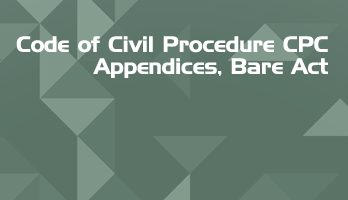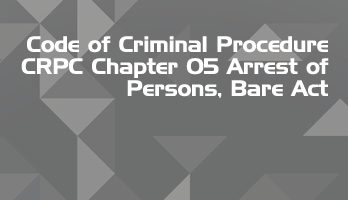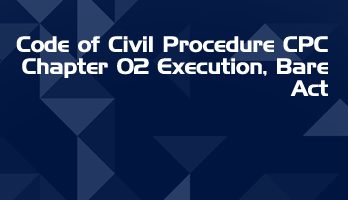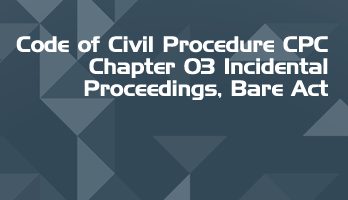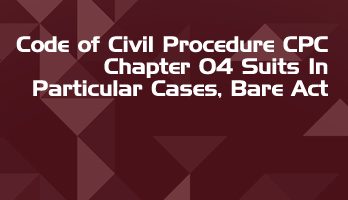A 'Bare act' is the actual legislation passed by the Parliament of India. Generally, an act sets out the high level legal and policy principles applicable to the subject matter of the law.
Most acts are accompanied by 'subsidiary legislation' such as rules, regulations, notifications and orders; which address the actual implementation detail of the act.
Free Full Course Available on LawMint's YouTube Channel
How to Land Your Dream LLB Internship in a Top Law Firm
- Part 1 - Introduction
- Part 2 - Internship Planning
- Part 3 - Internship Research
- Part 4 - Building Your Profile
- Part 5 - The Email
- Part 6 - The Resume
- Part 7 - The Cover Letter
- Part 8 - The Interview
- Part 9 - Self Development
Practical and comprehensive course, with real examples and step-by-step analysis of the complete internship application process. Check out LawMint's YouTube channel now!
Code of Criminal Procedure, 1973
Chapter 22 – Attendance Of Persons Confined Or Detained In Prisons
Section 266 – Definitions
In this Chapter,
- “detained “includes detained under any law providing for preventive detention;
- “prison” includes,
- any place which has been declared by the State Government, by general or special order, to be a subsidiary jail;
- any reformatory, Borstal institution or other institution of a like nature.
Section 267 – Power to require attendance of prisoners
- Wherever, in the course of an inquiry, trial or other proceeding under this Code, it appears to a Criminal Court.
- that a person confined or detained in a prison should be brought before the Court for answering to a charge of an offence, or for the purpose of any proceedings against him, or
- that it is necessary for the ends of justice to examine such person as a witness, the Court may make an order requiring the officer in charge of the prison to produce such person before the Court for answering to the charge or for the purpose of such proceeding or as the case may be, for giving evidence.
- Where an order under Sub – Section (1) is made by a Magistrate of the second class, it shall not be forwarded to, or acted upon by the officer in charge of the prison unless it is countersigned by the Chief Judicial Magistrate to whom such Magistrate is subordinate.
- Every order submitted for countersigning under Sub – Section (2) shall be accompanied by a statement of the facts which, in the opinion of the Magistrate, render the order necessary, and the Chief Judicial Magistrate to whom it is submitted may, after considering such statement, decline to countersign the order.
Section 268 – Power of State Government to exclude certain persons from operation of section 267
- The State Government may, at any time having regard to the matters specified in Sub – Section (2), by general of special order, direct that any person or class of persons shall not be removed from the prison in which he or they may be confined or detained and thereupon, so long as the order remains to force, no order made under section 267, whether before or after the order of the State Government, shall have effect in respect of such person or class of persons.
- Before making an order under Sub – Section (1), the State Government shall have regard to the following matters, namely:
- the nature of the offence for which, or the grounds on which, the person or class of persons has been ordered to be confined or detained in prison;
- the likelihood of the disturbance of public order if the person or class of persons is allowed to be removed from the prison;
- the public interest, generally.
Section 269 – Officer in charge of prison to abstain from carrying out order in certain contingencies
Where the person in respect of whom an order is made under section 267,
- is by reason of sickness or infirmity unfit to be removed from the prison; or
- is under committal for trial or under remand pending trial or pending a preliminary investigation; or
- is in custody for a period which would expire before the expiration of the time required for complying with the order and for taking him back to the prison in which he is confined or detained; or
- is a person to whom an order made by the State Government under section 268 applies, the officer in charge of the prison shall abstain from carrying out the Court’s order and shall send to the Court a statement of reasons for so abstaining: Provided that where the attendance of such person is required for giving evidence at a place not more than twenty – five kilometers distance from the prison, the officer in charge of the prison shall not so abstain for the reason mentioned in clause (b).
Section 270 – Prisoner to be brought to Court in custody
Subject to the provisions of section 269, the officer in charge of the prison shall, upon delivery of an order made under Sub – Section (1) of section 267 and duly countersigned, where necessary, under Sub – Section (2) thereof, cause the person named in the order to be taken to the Court in which his attendance is required, so as to be present there at the time mentioned in the order, and shall cause him to be kept in custody in or near the Court until he has been examined or until the Court authorises him to be taken back to the prison in which he was confined or detained.
Section 271 – Power to issue commission for examination of witness in prison
The provisions of this Chapter shall be without prejudice to the power of the Court to issue, under section 284, a commission for the examination, as a witness, of any person confined or detained in a prison; and the provisions of Part B of Chapter XXIII shall apply in relation to the examination on commission of any such person in the prison as they apply in relation to the examination on commission of any other person.
Important Central Acts in Regional Languages
Legislative department website also features regional language versions of several important Central Acts.
Free Full Course Available on LawMint's YouTube Channel
How to Land Your Dream LLB Internship in a Top Law Firm
- Part 1 - Introduction
- Part 2 - Internship Planning
- Part 3 - Internship Research
- Part 4 - Building Your Profile
- Part 5 - The Email
- Part 6 - The Resume
- Part 7 - The Cover Letter
- Part 8 - The Interview
- Part 9 - Self Development
Practical and comprehensive course, with real examples and step-by-step analysis of the complete internship application process. Check out LawMint's YouTube channel now!





